In the Name of Allah, the Most Gracious, the Ever Merciful…
QUICK LINKS TO THE WORKBOOK:
Amazon USA: Paperback | Hardcover | Kindle
Amazon UK: Paperback | Hardcover | Kindle
Amazon CAN: Paperback | Hardcover | Kindle
Amazon AUS: Paperback | Hardcover | Kindle
PDF Versions: PDF Workbook | English Text (Mobile) | Arabic Text (Mobile)
Wholesale orders: Email: Publications@Bakkah.net | Latest Catalog
When we recommend any products available on Amazon, as an Amazon Associate we may benefit from qualifying purchases when you follow our links from Bakkah.net. This helps us offset the costs of maintaining the website, and we do appreciate your understanding and support!
Here you will find helpful resources and guidance, by Allah’s Permission, connected to the study of al-Arba’een an-Nawawiyyah (an-Nawawee’s Forty Hadeeth) in the English Language. You can also learn some very interesting historical details about the course which was completed at al-Masjid al-Awwal in Pittsburgh, Pennsylvania (USA), as well as many important things about the course materials and other resources, as well as what upcoming recordings and resources you can look forward to, in shaa’ Allah.
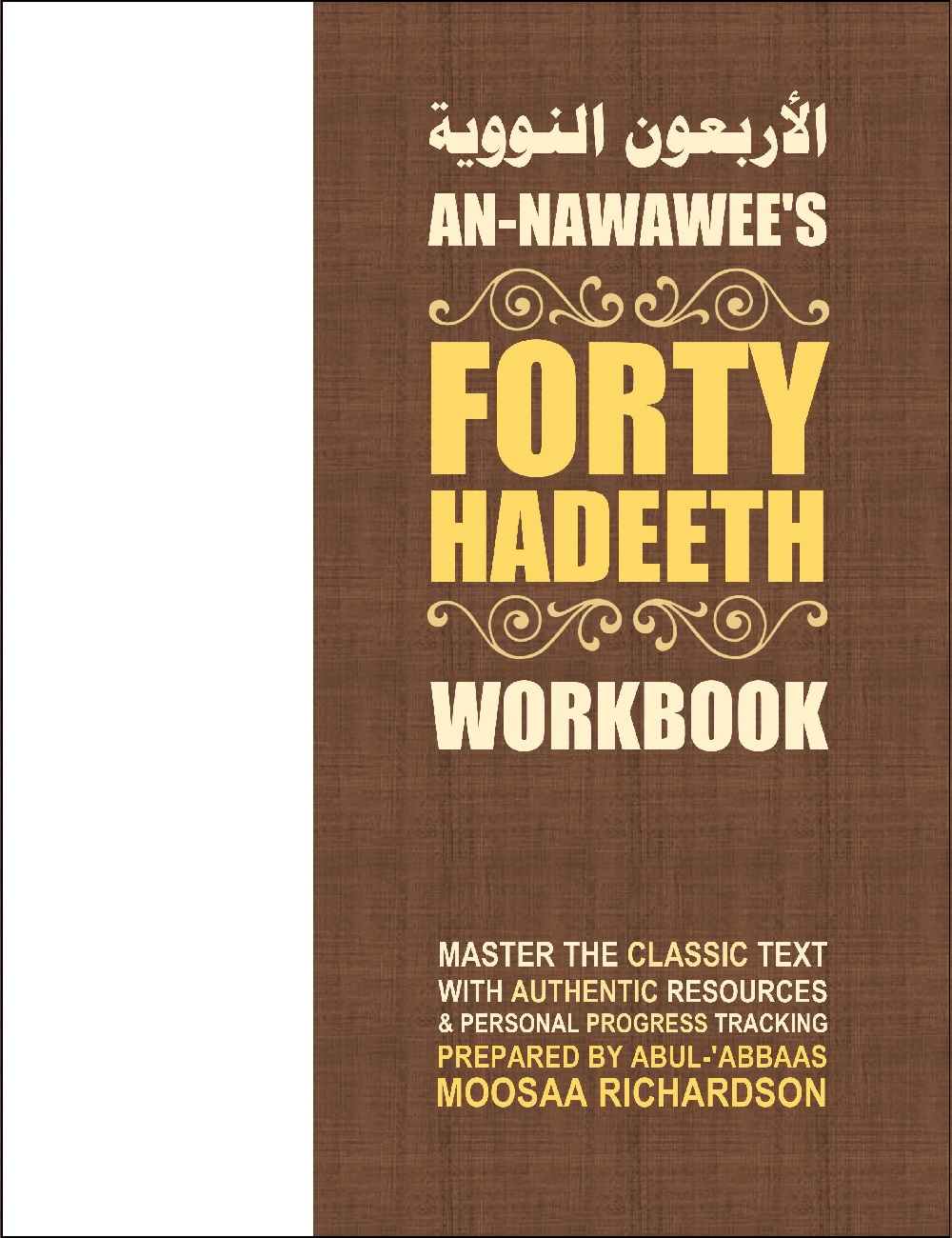
The Course: An-Nawawee’s Forty Hadeeth
Shortly after my return to America, our respected community at al-Masjid al-Awwal in Pittsburgh suggested that I teach the Forty Hadeeth Collection of al-Haafidh an-Nawawee (may Allah have Mercy on him), along with the explanation of one of my teachers, Shaykh Saalih al-Fowzaan (may Allah preserve and protect him). Seeking the Aid and Assistance of Allah, I obliged and (I believe) we began our study on Saturday night, the eve of the 15th day of Muharram, 1436. [1] (This corresponds to November 8, 2014 on the modern pagan calendar.)
Shortly after we began this new weekly class, on the eve of the 11th day of Safar, I was given a precious gift – my copy of the book, al-Minhat ar-Rabbaaniyyah (the explanation of Shaykh Saalih al-Fowzaan, by my beloved brother, Abur-Rabee’ Nafees ibn Muhammad Moorefield (may Allah bless and protect him). As is my custom in receiving books as gifts, I made a note about that on the title page:
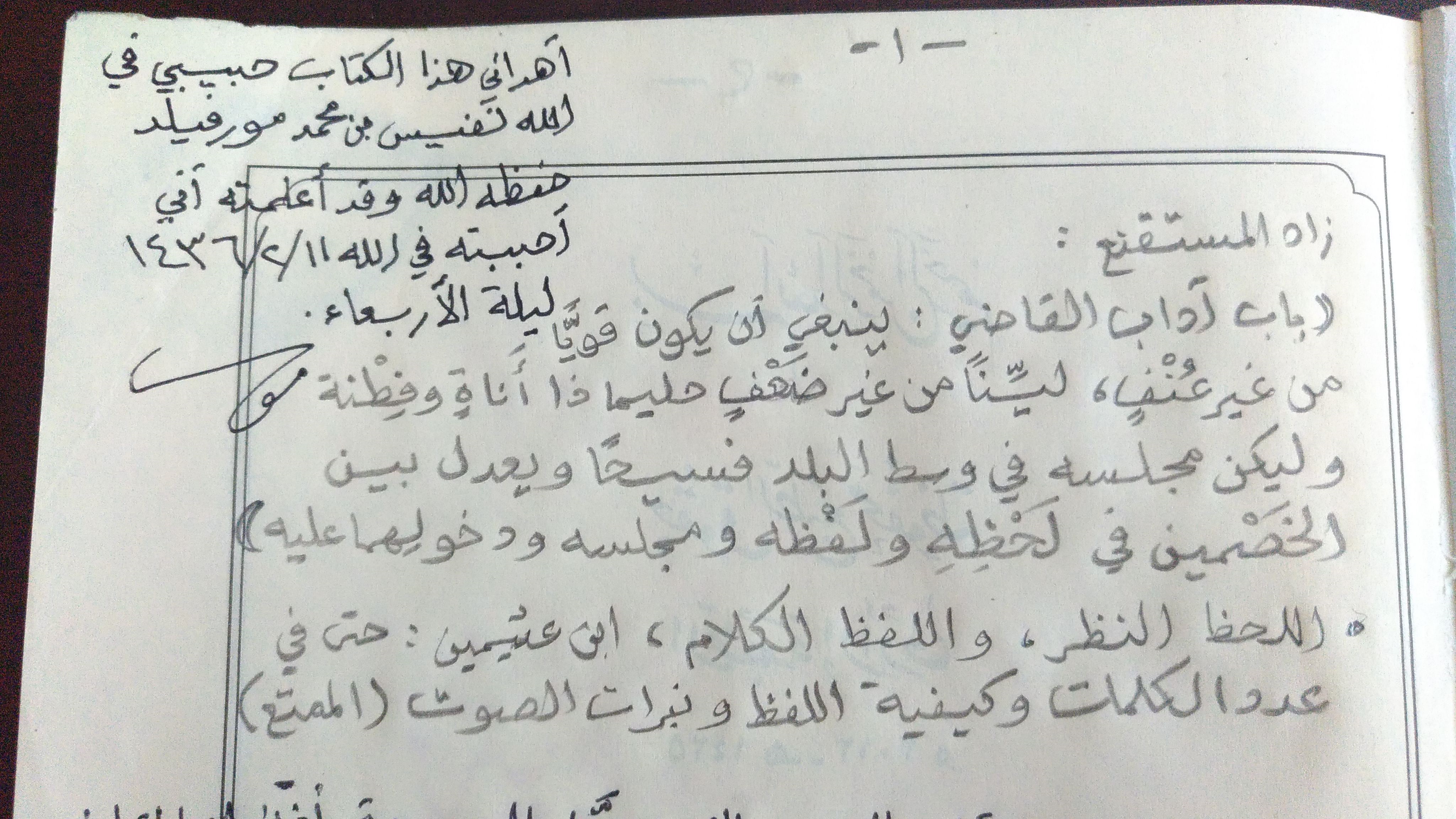
Not yet realizing the magnitude of the great blessing of the four-year epic journey which Allah would facilitate, we eagerly began reading through the book and its explanation, word-for-word, (almost) every Saturday night at the masjid. The imaam of al-Masjid al-Awwal, Aboo ‘Abdil-Fattaah Salaah Brooks (may Allah bless and protect him) was the primary reader of both the Arabic text and its explanation and translation, for the majority of the course. I supervised that reading and translation and added commentary where I hoped would be beneficial. This went on for almost four years, in a total of 146 gatherings, with our last class on the 23rd of Thul-Qa’dah, 1439. (This corresponds to August 4, 2018 on the modern pagan calendar.)
The Study of a Single Hadeeth Completed in Over Eight Months
Al-hamdulillaah, all praise is due to the One who no good thing is accomplished nor completed except through His Grace and Facilitation! Allah, the Mighty and Majestic, granted us the patience and commitment to study Hadeeth #2 of the book, the famous “Hadeeth of Jibreel” in a total of 28 sessions, spanning more than eight months, from the 14th of Safar to the 24th of Shawwaal, 1436, as documented below:
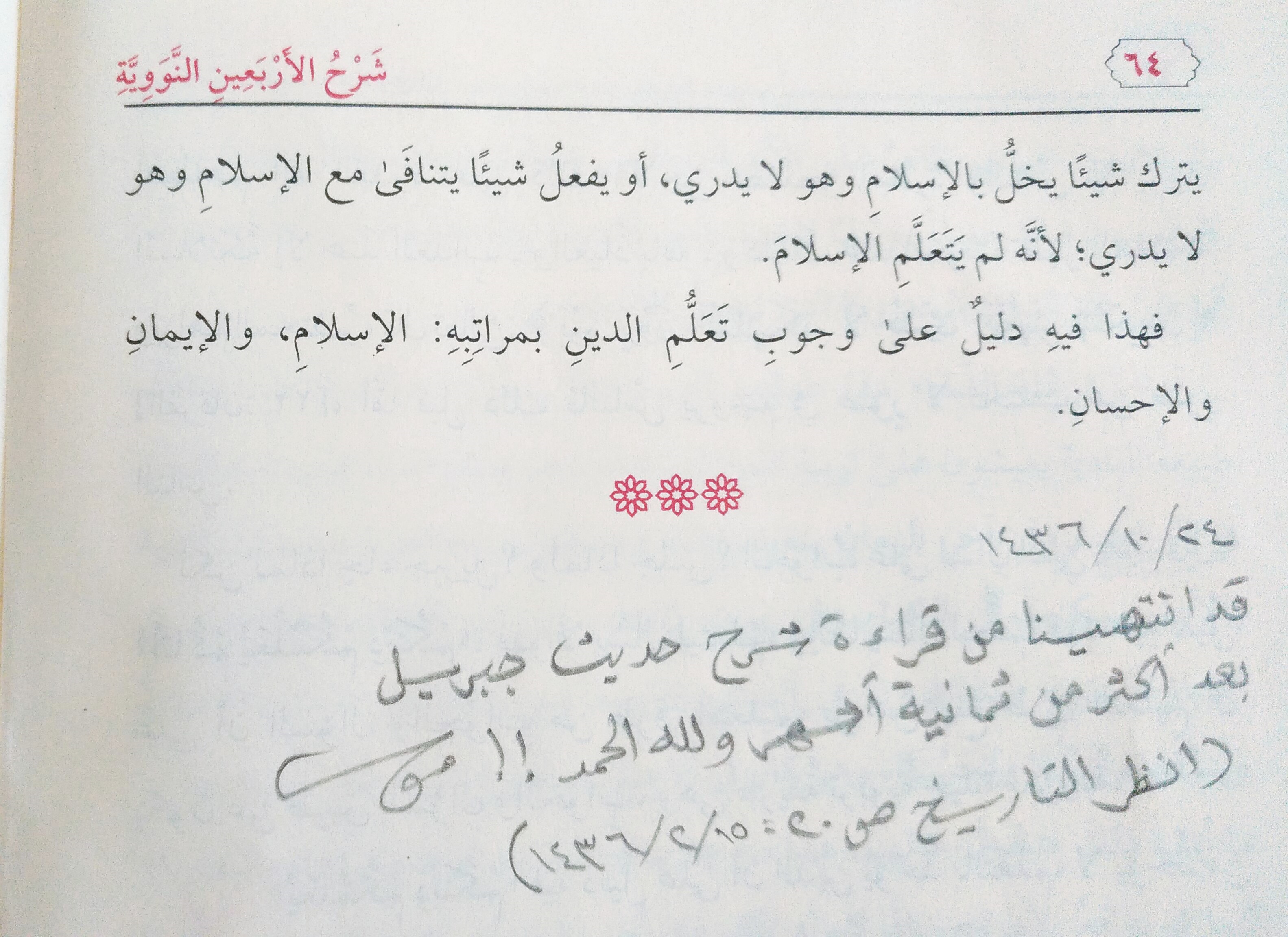 The Book, al-Minhat ar-Rabbaaniyyah
The Book, al-Minhat ar-Rabbaaniyyah
Shaykh Saalih al-Fowzaan (may Allah preserve and protect him) began his classes in explanation of the Forty Hadeeth after Fajr Prayer on 19th of Shawwaal, 1426, at the Hammaad as-Salaamah Mosque in the Fayhaa’ District of Riyadh, Saudi Arabia. This is according to ‘Aadil Rifaa’ee (may Allah reward him), the one who recorded and transcribed the shaykh’s lessons into what we now know as the book, al-Minhat ar-Rabbaaniyyah. Below is the actual written permission granted by the shaykh for that printing:
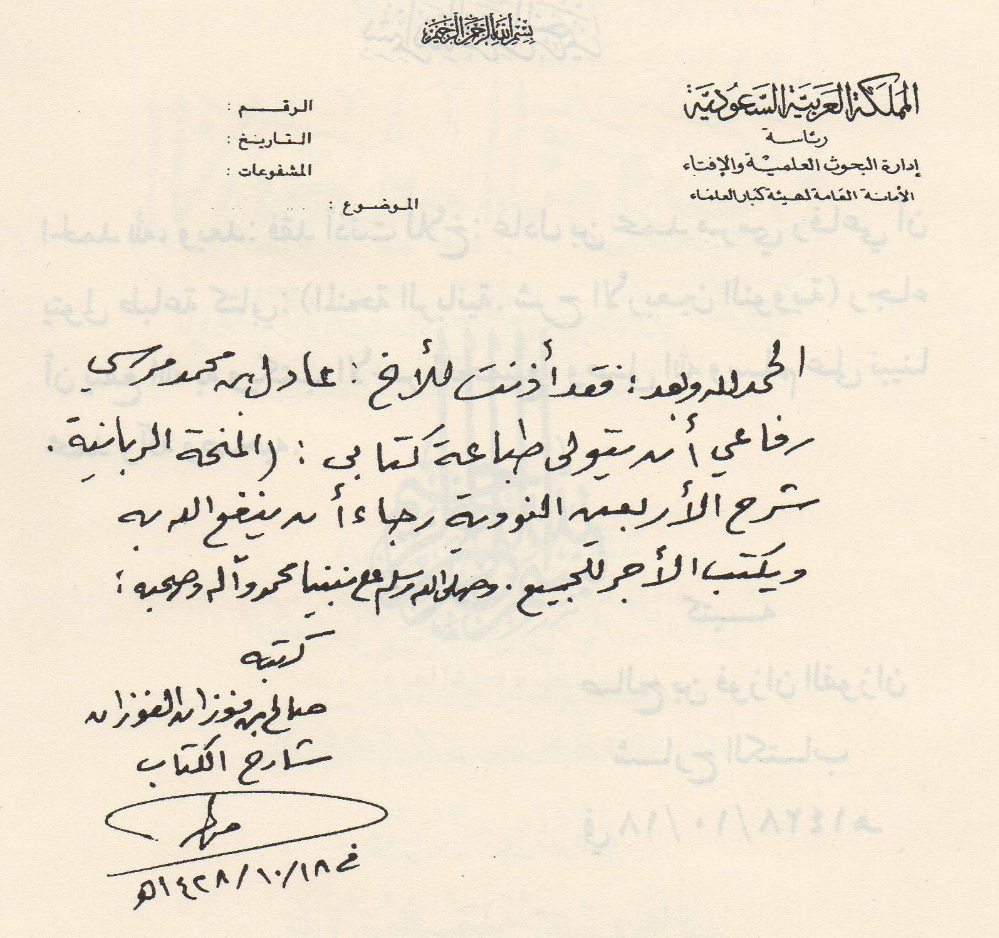
During al-Masjid al-Awwal’s Forty Hadeeth course, our brother, Aboo ‘Abdil-Fattaah Salaah Brooks (Imam of the masjid), was reading from his copy of the Daar al-‘Aasimah printing, as prepared by ‘Aadil Rifaa’ee, featured below:
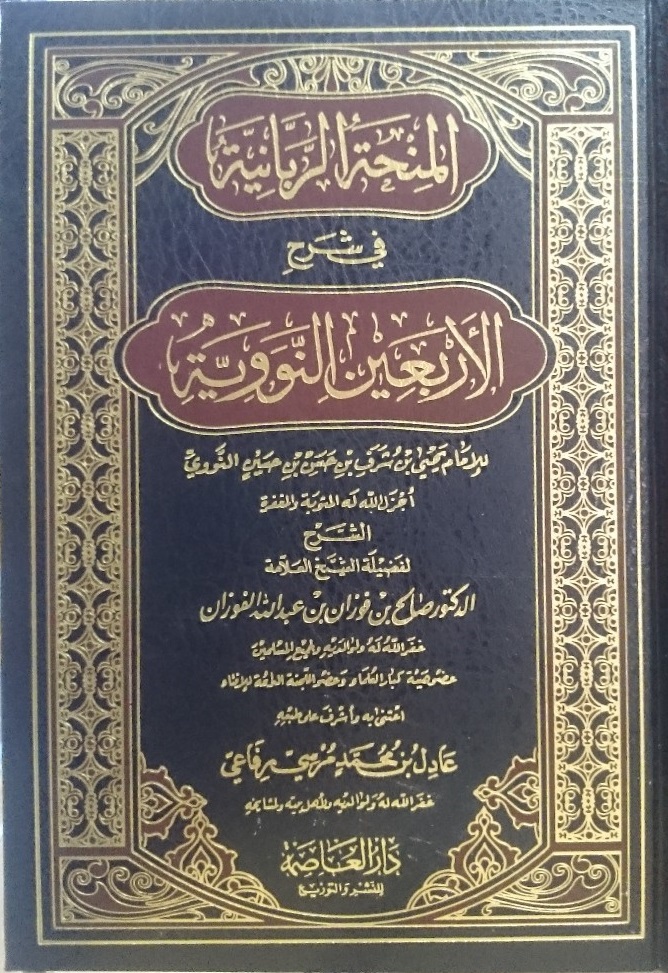
Many students prefer this copy over other printings for two basic reasons:
- It is the copy which has direct permission from the author.
- Arabic Language learners appreciate the complete voweling of the entire text.
There is no argument against the Rifaa’ee printing being more preferred because of the first reason above. However, looking critically at reason #2, I personally believe that Arabic Language learners typically hang on to the unnecessary crutch of fully-voweled Arabic texts far too long. This commonly leads to slower progress and less self-confidence, when students need the strength and momentum of “graduating” into reading from unvoweled texts. Few realize the importance of this. Printings of books with full tashkeel (vowel markings) typically are riddled with errors in those markings. The result is Arabic Language learners who rely on it, even following it blindly in mistakes, when they know how to pronounce some of those words correctly. [2] This very important need for learners to get away from fully-voweled Arabic texts is the reason behind the method of preparing our workbooks at Bakkah Publications. So, in my opinion, there may be some merit and advantage to using another printing.
Below is an alternate printing of Shaykh Saalih al-Fowzaan’s explanation of the Forty Hadeeth, al-Minhat ar-Rabbaaniyyah, which I used to read along in our masjid’s course. It is not fully voweled, and it is therefore -in my opinion- advantageous over the Daar al-‘Aasimah printing, from that angle alone. It is the first edition of ad-Daar ‘Aalamiyyah’s printing, in the year 1435 (the one given to me by my brother Nafees):
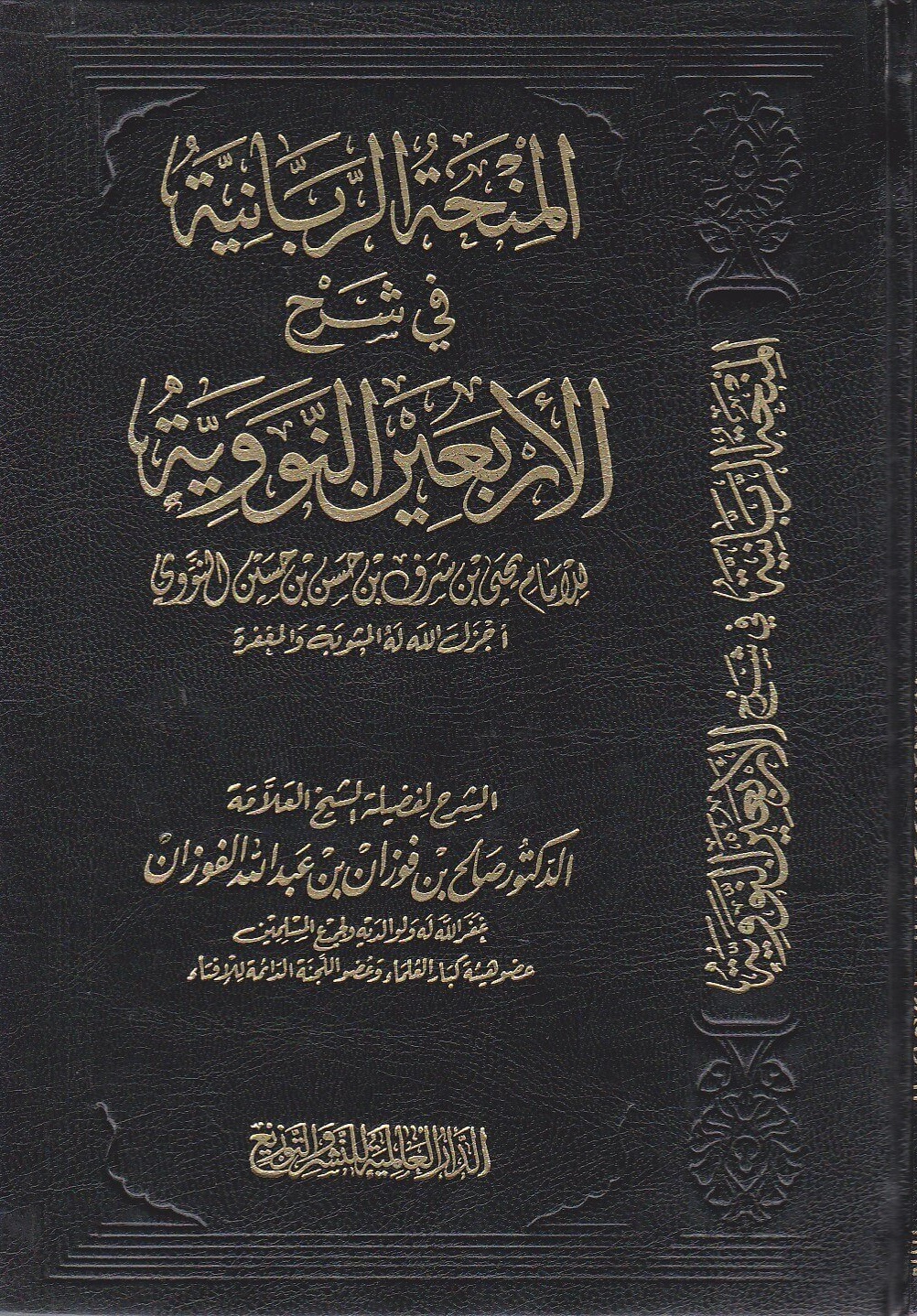
And here is what my copy of that printing looks like today (!), after that four-year study:
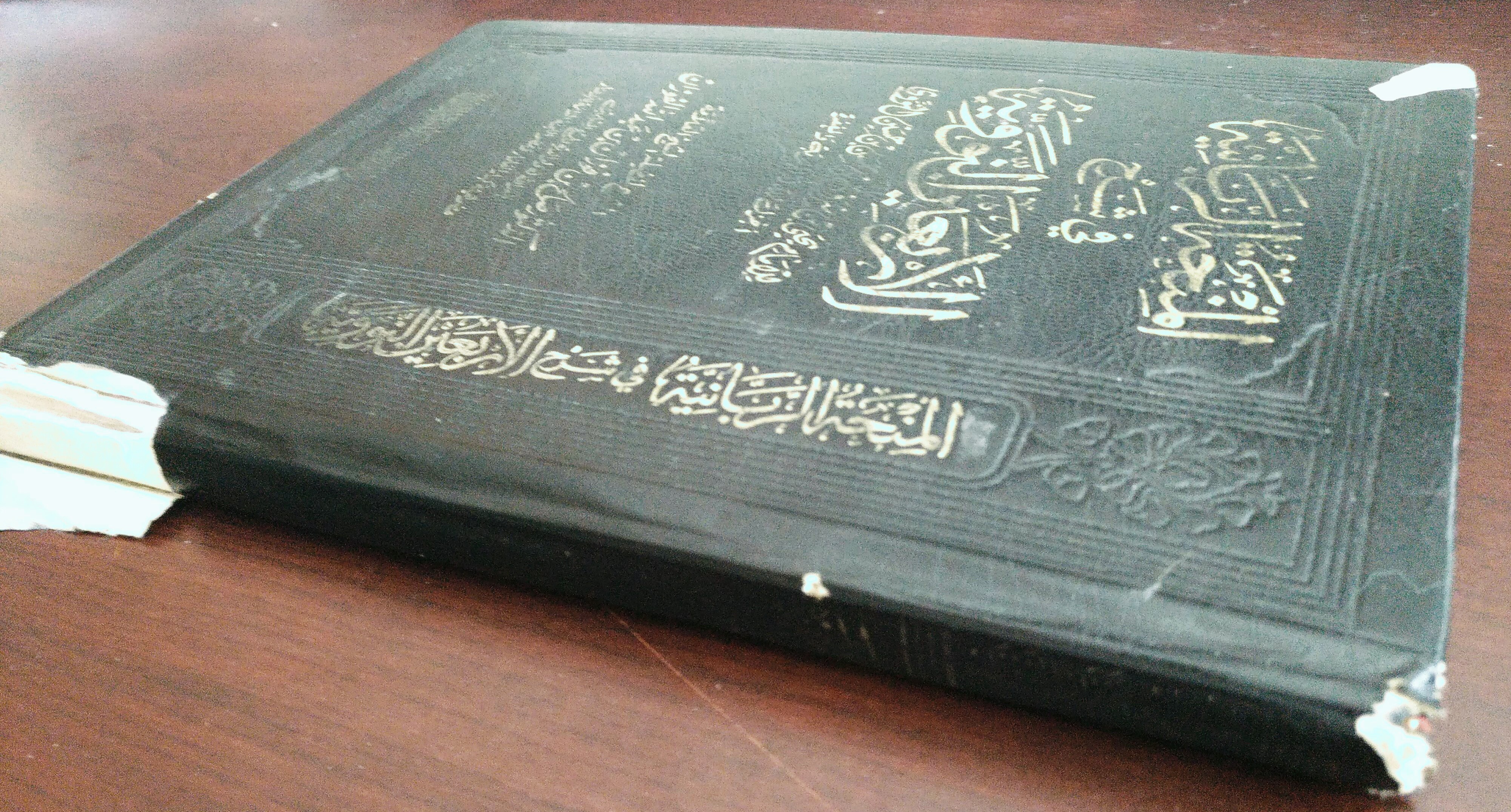 Here are some samples of some of my personal notes found in it:
Here are some samples of some of my personal notes found in it:
- pp.240-241 Important notes about excessive questioning
- pp.234-235 Regarding the lack of authenticity of Hadeeth #41
- pp.230-231 Regarding the excuse of coercion
- pp.210-211 Random notes
- pp.196-197 Criticism of the authenticity of Hadeeth #31
- pp.190-191 Narrations of the virtues of silence
- p.132 Random notes
- p.1 Shaykh Rabee’ on al-Haafidh an-Nawawee
As our scholars remind us, the blessing of knowledge is not in building large decorative libraries. Knowledge is attained when you give yourself fully to its path, studying and wearing out your books from heavy use. We ask Allah for patience in seeking knowledge, and sincerity before, during, and after our classes!
Slides, Worksheets, Quizzes, and Other Resources
Throughout our course, we used a variety of approaches to supplement the lectures. For example, we used PowerPoint slides. Our first attempts were quite basic, while the later results were more refined. Compare this slide show of Hadeeth #1 to this slide show of Hadeeth 42. 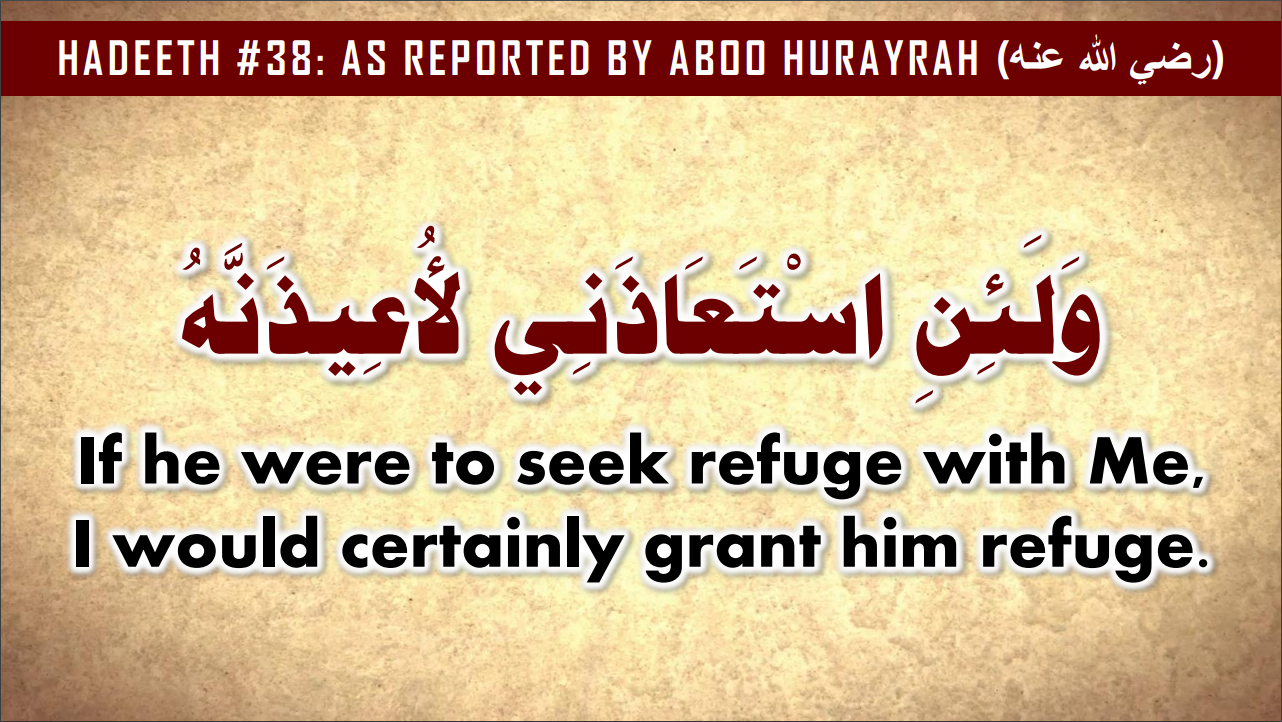
We also supplemented many of our classes with printed worksheets. Copies would be handed out before the classes, and electronic versions (PDF’s) would be made available on our website for our online listeners. These worksheets had review and/or preview questions, as well as key points to listen for during the lecture. Here are some real examples of those worksheets: 1 | 2 | 3
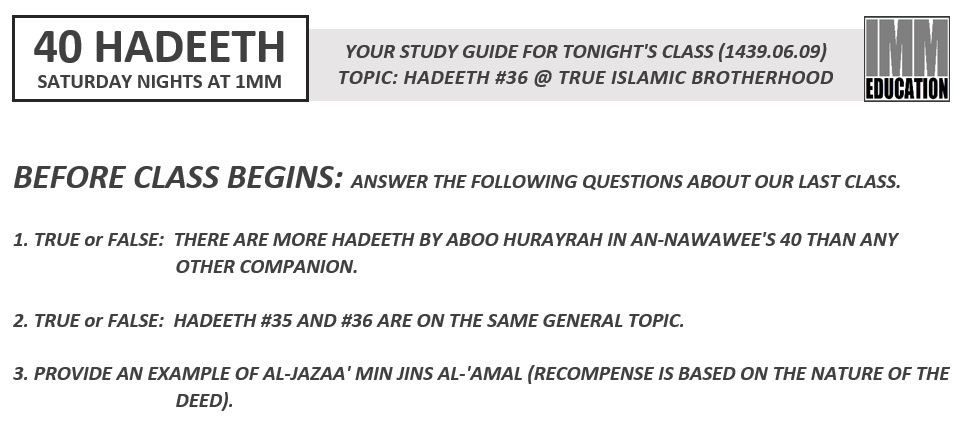
A complete version of the Arabic text [PDF] of the Forty Hadeeth was available online. At times, we had informal review sessions and quizzes online, using the university level testing software, TC Exam:
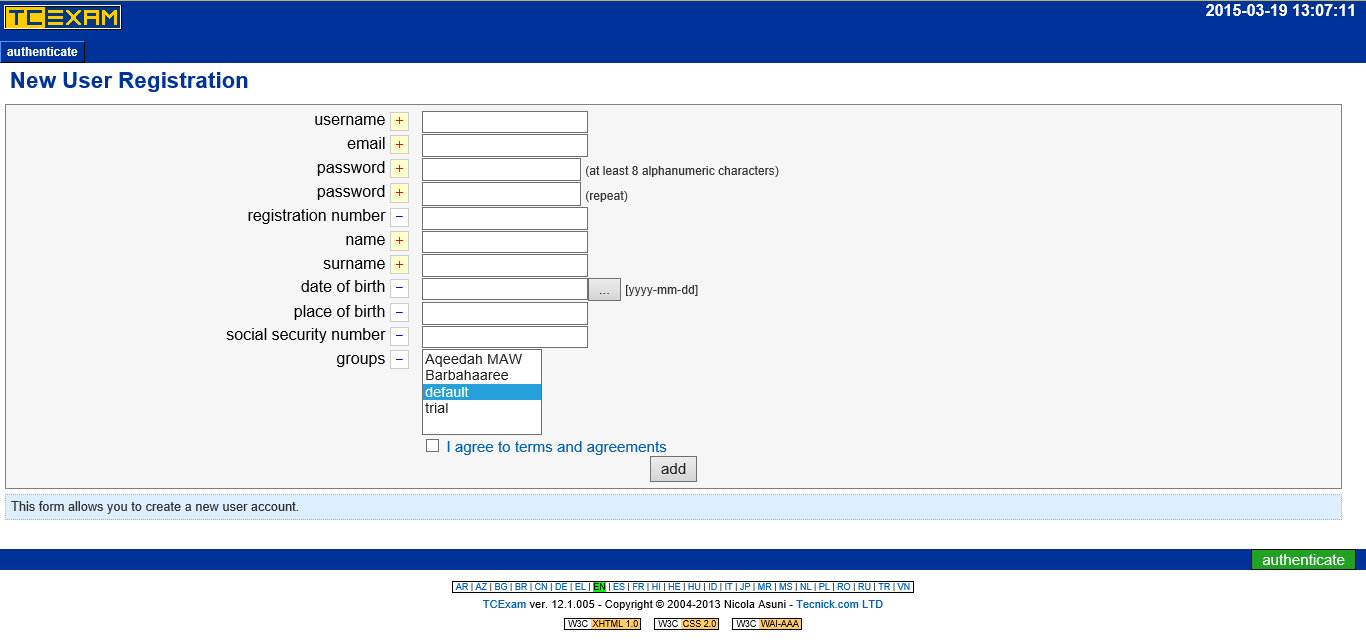
Invitations to this and other weekly classes were always openly printed on the backs of our prayer schedules [example]. We would also include our regular classes in special weekends, hoping to draw the attention of the special weekend attendee to the need for regular attendance at weekly classes [example]. May Allah accept these efforts!
The Forty Hadeeth Workbook
As mentioned, the need to graduate into reading unvoweled Arabic texts is behind the design of our workbooks. While we’ve included an accurately voweled Arabic text for absolute beginners, we encourage students to move forward into the non-voweled text as soon as they can! Our recent publication, the Forty Hadeeth Workbook includes quizzes, a personal progress tracker, a complete original manuscript, and some very important resources for your complete study and [hopefully, in shaa’ Allah] mastery of this essential primer. [Sample PDF]
The workbook, which we hope is the most comprehensive resource you could have as a study companion, is now available on Amazon, in traditional paperback print and on Kindle.
QUICK LINKS TO THE WORKBOOK:
Amazon USA: Paperback | Hardcover | Kindle
Amazon UK: Paperback | Hardcover | Kindle
Amazon CAN: Paperback | Hardcover | Kindle
Amazon AUS: Paperback | Hardcover | Kindle
PDF Versions: PDF Workbook | English Text (Mobile) | Arabic Text (Mobile)
Wholesale orders: Email: Publications@Bakkah.net | Latest Catalog
When we recommend any products available on Amazon, as an Amazon Associate we may benefit from qualifying purchases when you follow our links from Bakkah.net. This helps us offset the costs of maintaining the website, and we do appreciate your understanding and support!
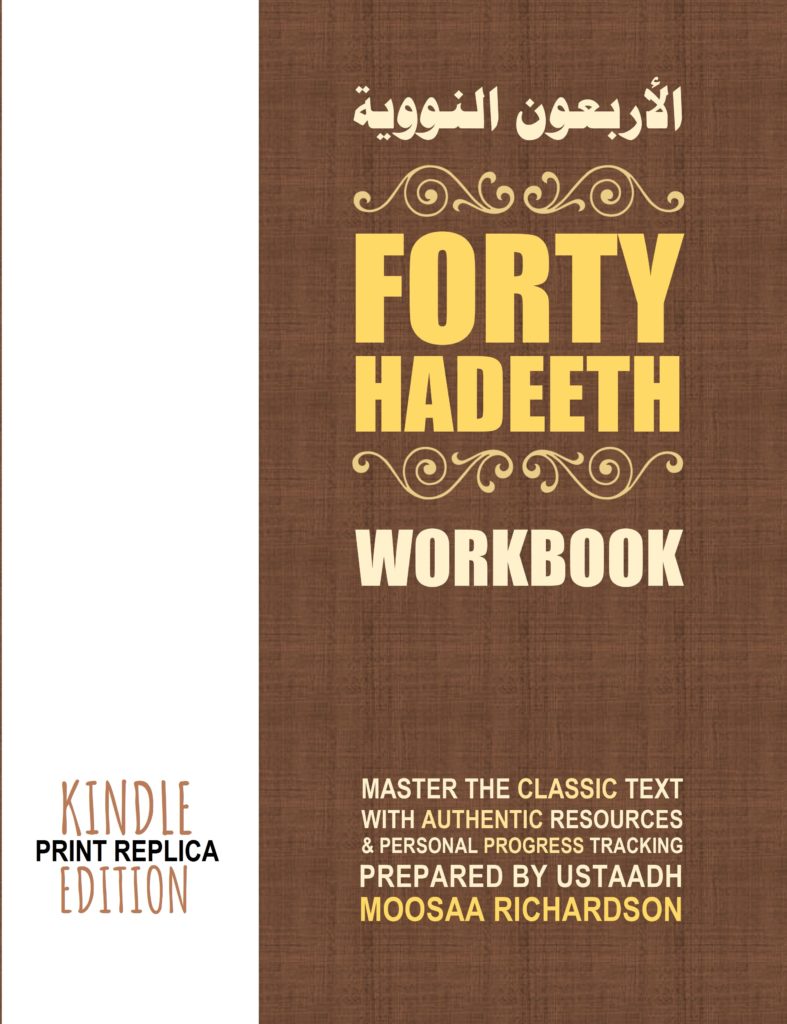
The Recorded Lessons (FREE)
By Allah’s Permission, al-Masjid al-Awwal continues to make quality recordings of these classes available for free downloading and listening on the masjid’s public Spreaker channel: www.Spreaker.com/user/radio1mm. Newly released recordings from this series continue to become available, in shaa’ Allah. If you appreciate these efforts, please consider supporting the masjid with your charitable donations here: http://www.firstmuslimmosque.com/donateto1mm/.
Where are the Missing Audios?
Please be patient. We plan to continue releasing newly re-mastered audio from this series, until all recordings have been made public, in shaa’ Allah. May Allah aid us and grant us success.
UPDATE: An eight-part study of the author’s introduction, as well as Hadeeth #1, in three parts, has been uploaded to our Spreaker channel, wal-hamdu lillaah.
Additional Resources
Hadeeth #43: Inheritance worksheet
Your Feedback Please
What else would you like to see featured on this resource page? Do you have any questions or comments about the course or its materials? Let us know in the comments below.
Written by: Moosaa Richardson (1441.12.18)
Updated by: Moosaa Richardson (1444.12.21)
FOOTNOTES:
[1] This date might be inaccurate, by as much as a week or two, as my official documented record shows the second class was taught on 1436/01/22. This second class starts the reading of the book, yet I believe the week before it was an introductory class, and the recording was not preserved.
[2] For a quick example [and there are many], one needs to look no further than the second line of the explanation of the very first hadeeth in the fully-voweled Daar al-‘Aasimah printing. The word “Sihhatihi” (صحته) is mis-voweled as “Sahhatihi” [as seen here]. The Arabic learner may then learn the word wrong, or possibly question what he thought was correct. The point is: Fully-voweled texts can be seriously counter-productive once the student has basic reading skills. And Allah knows best.
*When we recommend any products available on Amazon, we reserve the right, as an Amazon Associate, to benefit from qualifying purchases when you follow our links from Bakkah.net. This helps us offset the costs of maintaining the website, and we do appreciate your understanding and support.

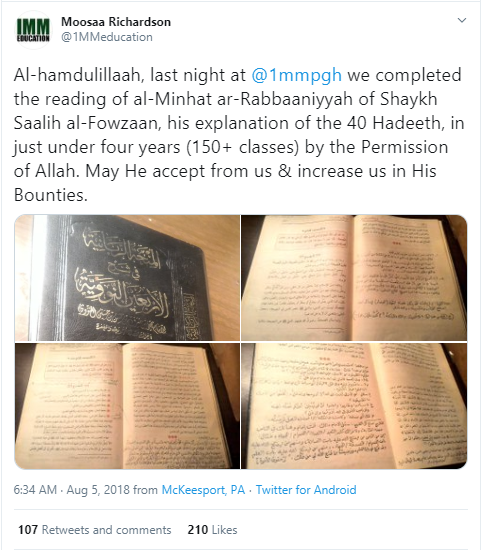
As-salaamu Alaykum,
Ustaadh, when you say your teacher Shaykh Fawzan does this mean you have had personal lessons with him? Or that you studied in person with the Shaykh? Or it means you take from him simply.
Just trying to clarify if we can call a shaykh our teacher. Or even the tulaab for example if I listen to your lecture series can I call you my teacher.
BarakaAllahu feek.
Wa ‘alaykum as-Salaamu wa rahmatullaah. From the great favors of Allah upon me, I have attended some of his lessons regularly in Jeddah and Makkah. And when I traveled to Riyaadh and al-Madeenah I sat in some of his classes as a visitor there. I have corresponded with the shaykh in writing and visited him in his office in Riyaadh to ask questions personally. I have also translated some of his works, and he has personally written an authorization for one of my translations. May Allah bless him and preserve him.
السلام عليكم ورحمة الله وبركاته
Shaykh, may Allaah preserve you. How are we going to be able to easily share these recordings with brothers in prisons?
وعليكم السلام ورحمة الله وبركاته
May Allah make it easy. We actively submit content, hoping it gets approved for inmates to access, but it is not easy. May Allah give us success. Here is a list of available recordings that inmates may be able to access on their tablets: https://www.bakkah.net/en/wp-content/uploads/2020/08/ISLAMIC-LECTURES-ON-INMATE-TABLETS-20200728.pdf. Please take the time to print it and send it by mail to any inmate(s) you may know.
Ameen.
Shaykh, may Allaah reward you for taking the time to read and respond and sharing the pdf.
My main concern was for brothers in higher levels of prisons. As far as I know, tablets are only available for Medium level security. It’s not available for those in High security or USP.
May Allaah reward you with good
There are people in state prisons (doing life without parole for murder) who have access to tablets, wal-hamdu lillaah.
السلام عليكم
Ustaadh, may Allah reward you and everybody involved in this project for the efforts. The recordings start from hadeeth number 6, is there any way we can get the previous recordings starting from hadeeth number 1 or we should wait for them to be published every Monday?
Jazaakum Ullaahu khayran
وعليكم السلام ورحمة الله
We’ll be announcing an additional schedule to publish Hadeeths 1-5 soon, in shaa’ Allah.
Asalamu Aleykum Shaykh,
What is the Islāmic ruling on colors?
To follow the Sunnah of opposing the disbelievers and wicked sinnners, is it correct to hate and avoid a color associated with evil people? For instance, purple color with its different variations is specifically associated with homosexuals.
In certain Hadiths, it’s mentioned the Prophet Sallallaahu’Alayhi Wasallam liked white clothes and disliked yellow. He was shinning more than the sun when he wore red garment.
Or do purple continues to be Mubaah just as was it before 20th century no matter how disbelievers and wicked, immoral sinners change its meaning and association especially since some trees and flowers have purple color?
If you give me evidence that purple still rains mubaah just like yellow remains mubaah to use, is it okay if I personally hate or don’t use and consume things that have purple color like texts and images of a content?
In sum,
What is the Islāmic ruling of colors and how do we deal with it in things we use or consume?
JazakAllah Kheyr for answering.
Wa ‘alaykum as-Salaamu wa rahmatullaah. We shun any color or style of clothing that becomes known in our culture as a sign of a particular group of disbelievers, innovators, or sinful people. This is part of muroo’ah (personal integrity and conformity to respected social standards), and Allah knows best.
I do not know that purple has become a clear sign of any specific people in my culture. Perhaps pink and purple items worn by men are becoming a sign of homosexuals. This could become more predominant in some areas. If that is the case, it should be avoided. If that is not clear, then remember: All dunyaa (worldly, non-religious) things are considered halaal, until clear evidence proves them otherwise. And you also have the right to your personal choice to dislike a certain color for yourself, but this cannot be enforced upon others, if it is merely a personal opinion. And Allah knows best.
Afwan for putting this in the wrong place but I just wanted to alert you that I came across an audio on the site in which Nouman Ali Khan speaks at length about how sincerity is not a requirement for an accepted action- giving the example of the one who fed the thirsty dog (I assume he wrongly presumed that the doer did not do this seeking the face of Allaah) I thought somewhere in that audio a refutation would follow, but it did not. Do you mind clarifying this whole point since I wanted to know what is the end of those actions which are merely done for ‘kindness’ and ‘compassion’ but not anticipating the pleasure or reward of Allaah? BaarakAllaahu Feek
Listen to this: https://www.spreaker.com/user/radio1mm/40h25-14380515-pt1of5-clips-nak-sincerit
As salamu aleykum Ustadh, may Allah bless you and preserve you. For some jobs they require us to take a picture for ID purposes like for being a food delivery driver for example. Would it be permissible to take this picture?
Wa ‘alaykum as-Salaamu wa rahmatullaah. Generally, the scholars who forbid photography, still allow for photo ID’s and things needed out of necessity, and Allah knows best.
asalamualaikum
i have been experiencing waswas for a while nw,even with regards my study of quran and arabic language,mostly regarding the arabic language.what do you advice is it better to quit the learning of the language
Wa ‘alaykum as-Salaamu wa rahmatullaah. As a rule, whenever you are doing something virtuous and praiseworthy, and doubts and confusion come to you about whether you should continue or not, seek the Aid and Assistance of Allah alone, and ask for strength and patience, and continue in that virtuous thing, like learning the Arabic Language. Allah says:
وإما ينزغنك من الشيطان نزغ فاستعذ بالله إنه سميع عليم
“If an evil whispering comes to you from the Shaytaan, then seek refuge with Allah; He is All-Hearing, All-Knowing.” [َQuran 7:200]
السلام عليكم ورحمة الله وبركاته
I have a question, in sha Allah. I have one volume of Tafsir Ibn Kathir. Rather then buying the entire set, I wanted to know if it was permissible for me to use a free PDF version of the whole set on the internet. Is this allowed? Barak Allah Feek.
وعليكم السلام ورحمة الله وبركاته
If the publisher gives you permission to download a PDF version, then that is their right to grant you that permission. Copyrights are legitimate rights in Islamic law, so they are to be upheld by the Muslims. And to be clear: And claims of “scholarly differing” are not to be used to take other people’s property. If you believe copyrights are not to be upheld then apply that to your publications, not those who disagree, and then you oppressively take their property, forcing your opinions on them and their property. And Allah knows best.
السلام عليكم
why did the authors at those times write the arabic books or the manuscripts in a rather unorganized manner without paragraphs, indents, line spaces etc. even if it was a work for the common people, meaning how can the people easily be able to read such books without making mistakes written in such way? isn’t it very possible that things are misread and something of religion is erroneously misunderstood if they are written like this ?
وعليكم السلام ورحمة الله
You are essentially asking me why people who lived before the era of modern formatting did not use formatting that had not yet existed in their culture. In those days, people who could read were very intelligent. Also, the need to use the space on the paper was a very important factor. They did not have the luxury of an abundance of paper, so as to leave blank space. And Allah knows best.
السلام عليكم
Are there more unknown hadith that could yet be known possibly in some ways like through new discovery of some manuscripts , or have we already discovered and received all the authentic hadiths of the messenger (صلى الله عليه و سلم) as of our time now?
وعليكم السلام ورحمة الله
Essentially, the hadeeths of missing books have already been indexed before the texts were lost, so at this point finding missing manuscripts would only confirm a few rare narrations that we already know of, but maybe do not have the actual chain from the source book, when that source book is not a mainstream one. Books of Fiqh, Usool, Tafseer, etc. have referenced those narrations, so no one can come along and bring a hadeeth that was never quoted in the history of Islam, except it would be known as a fabrication. And Allah knows best.
As salaamu alaykum,
I was wondering if there is any update on the postings of the lessons? It seems as though maybe part of Hadeeth 2, as well as all of Hadeeth 3-5 have not been posted yet.
Jazaakumullaahu khairan.
Wa ‘alaykum as-Salaamu wa rahmatullaah. There are still A LOT of audios from this series which have not yet been edited. May Allah reward you for your vigilance. We hope to make them available soon, in shaa’ Allah. May Allah give us success.
Asalaamu’alykum wa Rahmatullah. Ustadh I went through the link https://www.bakkah.net/en/wp-content/uploads/2020/08/MINHAT-001-bottom.jpg
which mentions the speech of Shaykh Rabee May Allah preserve him about some of the salaf falling into some Biddah and Shaykh Rabee mentioned that qatadah fell into Qadr. Can you please explain it more.
BarakAllah Feekum
Wa ‘alaykum as-Salaamu wa rahmatullaah. Attend our Friday night classes (Waasitiyyah), as we are currently going through Qadar in detail, and these issues will be explained, in shaa’ Allah.
لسلام عليكم ورحمة الله وبركاته
I was raised in Jeddah, KSA and have lived here most of my life but ironically and unfortunately never learned Arabic. I recently discovered your blog and lectures and wanted to start with your workbooks in the hopes that they would help me finally learn Arabic. But I wanted to ask you, which workbook do I start from and in what order do I do them? Do the workbooks get progressively more advanced as you go along?
And do you have suggestions (since I read somewhere that you used to live in Jeddah and Makkah) for good teachers of Arabic for female students that speak English in KSA?
(I can read Arabic with harakat)
I am okay if the classes are online as long as they help you actually progress and master reading/writing/speaking like an actual student of knowledge.
I like the format of your books too and the way you taught Arabic from the samples – so anyone who teaches in a format similar to yours or different but effective would be nice.
بارك الله فيك
Assalaamu alaikum wa rahmatullah dear ustaadh.
I am writing a question in this website for the first time. I sincerely apologize if this question is already asked many times.
I’ve been periodically checking spreaker.com for the remaining lectures of the 40 hadeeth class, and I have seen no updates for the long time (maybe several months?).
I just wanted to know if everything is ok and if you are doing your best to post the remaining lectures.
I wish you and all students of knowledge the best.
BarakAllahu fiikum.
Wa ‘alaykum as-Salaamu wa rahmatullaah wa barakaatuh. We’re actually focusing all our resources on keeping up with the current classes. We are looking for an opportunity to edit and release some of those older audios. Our apologies for the delay, and may Allah aid us to serve the Muslims in a better way!
As-salaamu Alaykum
Shaykh and Admin please release the rest of the recordings. As the workbook is out it and it would be great to complete this great book. Please consider releasing the rest of the audios or even weekly.
JazaakAllah khayr
As salaamu alaykum wa Rahmantulli wa barakatu Was the rest of the hadith jibreel classes ever uploaded?
Wa ‘alaykum as-Salaamu wa rahmatullaah wa barakaatuh. My goal is to review & publish them; there are just so many projects and time is limited, may Allah aid us! Thank you for your patience, respected brother Khidr.
Assalaamu Alaikum
Myself and a group of sisters from the muslim community here are studying the forty ahadeeth of Imam an Nawawi using your lessons. We’ve completed the introduction and the first hadeeth.
I noticed that the audios for ahadeeth 3-5 are missing. Will they be uploaded soon?
I know you are very busy but it would be immensely helpful if they could be made available in time for our study of the 3rd hadeeth.
May Allaah reward everyone for their efforts.
Wa ‘alaykum as-Salaamu wa rahmatullaah. May Allah bless you and give you success. We have those audio recordings and plan to edit and release them. May Allah make it easy.
Walaikum Assalam wa-Rahmatullahi wa-Barakaatuh,
In the meantime, here are some alternatives from our other Salafi teachers (may Allah reward them all) with complete audios available, which can help you fill some of the gaps. It is highly beneficial to study multiple explanations of these ahadith through these lessons, so you get a broader understanding of them, may Allah grant us success.
Abu Iyaad teaching the explanation of Shaykh Saalih Aal-ash-Shaykh: https://soundcloud.com/islamtees/sets/explanation-of-an-nawawis-forty-hadith
Abu Arwa Ali teaching the explanation of Shaykh Abdul Muhsin al-Abbad: https://soundcloud.com/alhudabolton/sets/40-hadith-of-imam-nawawi
Abu Muadh Taqweem teaching the explanation of Shaykh Saalih al-Fawzan: https://soundcloud.com/markazbukhari/sets/40-hadith-of-imam-an-nawawi